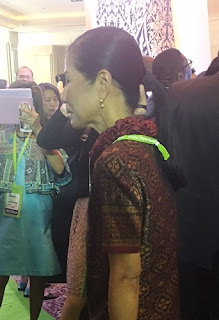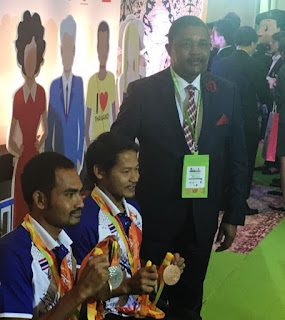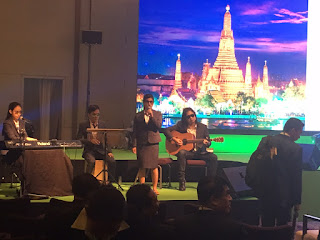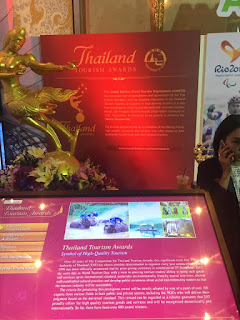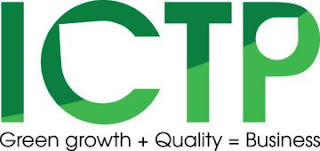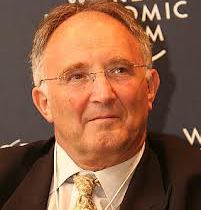
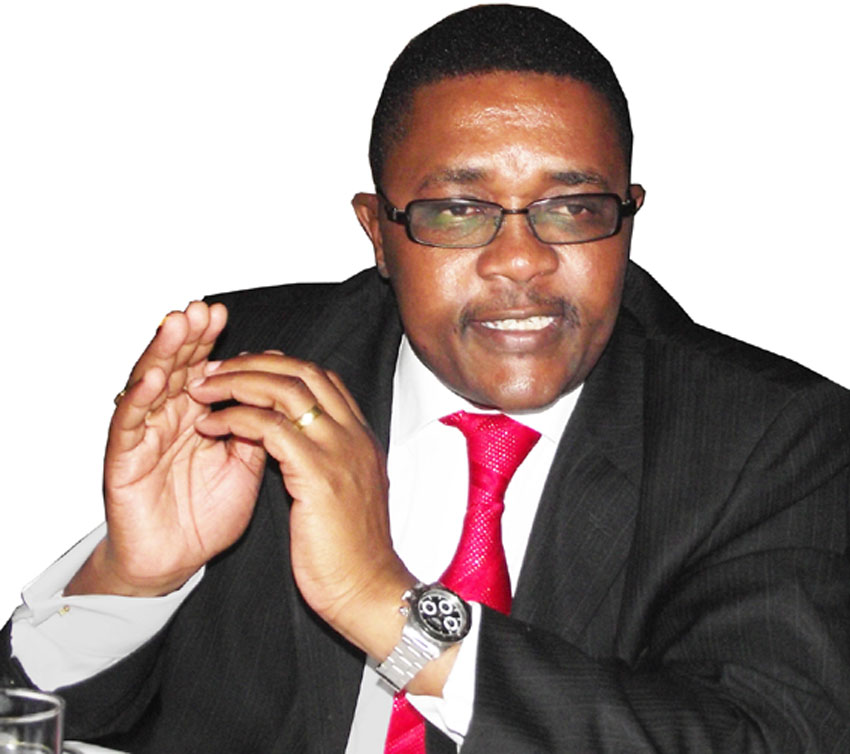
Dr. Walter Mzembi: A smile is the most universal expression of hospitality
World Tourism Day in Bangkok concluded yesterday. The last night was a night to remember for delegates to the UNWTO event.
One prominent delegate impressed with Thai Hospitality offered a toast during the Gala Night in Khon Kaen. He was Dr. Walter Mzembi who is running as a candidate to becoming the next UNWTO Secretary General.
Dr. Mzembi said:
-World Tourism Day was conceived 46 years ago, on the adoption of the WTO Statutes in 1970
– It was first celebrated in 1980
– I have participated and celebrated 8 WTDays, with various themes, culture, water, energy, Peace, etc
– I must confess this year’s theme is the most profound
-Tourism for all- Promoting Universal Accessibility
– Why because it celebrates love and humanity
-It is even more profound as it being celebrated through the most universal language
– A smile!
– Smiles are spoken more than any other language, Spanish, English, Arabic, Chinese, Indian, combined.
– A smile is the most universal expression of hospitality, without saying anything, or the spoken word, it exudes warmth and happiness!
– Don’t you think our generation has every reason to smile ?
– Yes we should smile for we are a very lucky people, lucky lot to be placed and raised at this moment in time, whose civilization and technological advancements has allowed this interaction , in peace and happiness
– Generations past were defined by conquest, each time different cultures interacted or met, they would establish supremacy first by fighting and eliminating each other
– At the Airport , several tens of cultures met and celebrated their diversity through song and dance, the smile leading the reception, bar language barriers, we understood that we were welcome through the smiles!
Keep it up Thailand and Hon Minister, my dear Sister once again Congratulations, on behalf of all International Delegates , we are taking very useful lessons with us to our various countries on the virtues of loving one another!
More Love !
I thank you!
God Bless You All!
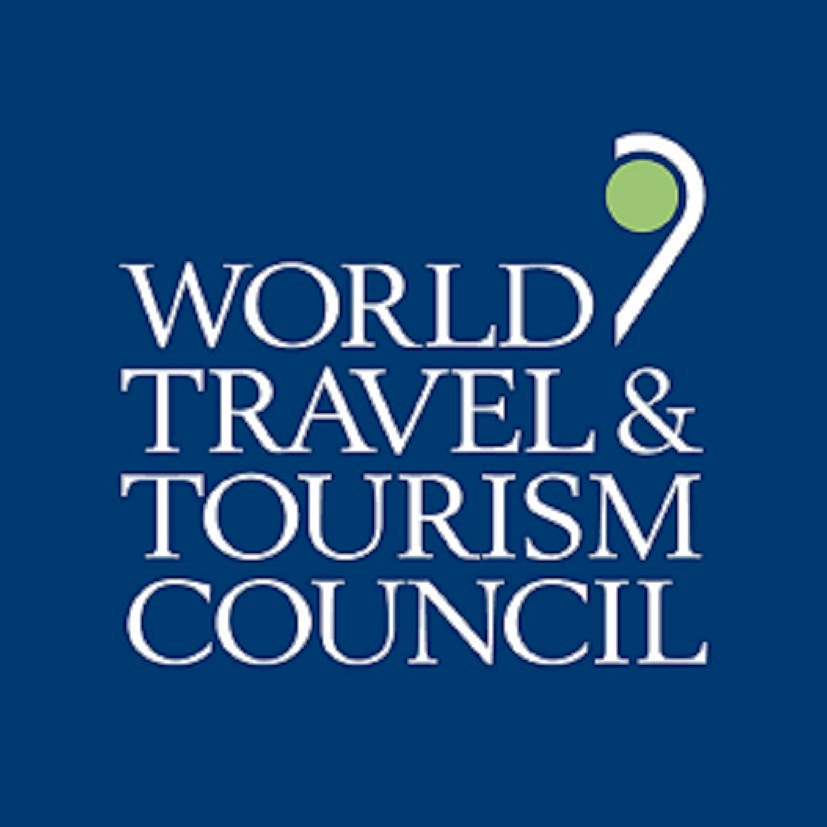
WTTC calls on governments to agree on global aviation carbon offsetting scheme
The World Travel & Tourism Council (WTTC) calls on all nation states to reach an agreement on the Carbon Offset and Reduction Scheme for International Aviation (CORSIA) at the International Civil Aviation Organization (ICAO) General Assembly in Montreal.
David Scowsill, President & CEO, WTTC, said: “CORSIA is an extremely important, if not mandatory step towards the aviation industry’s commitment to reduce carbon emissions. The scheme embodies the cooperation across the industry and across the public and private sector, something WTTC strongly believes in. We urge all governments to follow the lead of over 60 countries who already indicated their participation in the scheme, and ensure that this global and momentous agreement is reached.”
“In the face of climate change, and increasing demands for the sustainable growth of Travel & Tourism, we need to embrace and act upon this initiative to ensure we preserve the assets the world has to offer.” Scowsill added.”
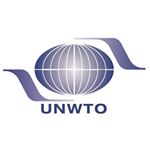
International tourist arrivals up 4% in the first half of 2016
Madrid, Spain, 29 September 2016, International tourist arrivals worldwide grew by 4% between January and June 2016 compared to the same period last year. Destinations worldwide received 561 million international tourists (overnight visitors), 21 million more than in 2015, according to the latest UNWTO World Tourism Barometer.
Asia and the Pacific demonstrated renewed strength this first half of 2016, receiving 9% more international arrivals, the highest growth across world regions. In the Americas, international arrivals increased by 4%, led by Central America and South America. Europe (+3%) showed mixed results, with solid growth in many destinations offset by weaker performance in others. In Africa (+5%), Sub-Saharan destinations rebounded strongly, while North Africa continued to report weak results. Limited data for the Middle East points to an estimated decrease of 9% in international arrivals this six-month period, though results vary from destination to destination.
“Tourism has proven to be one of the most resilient economic sectors worldwide. It is creating jobs for millions, at a time when providing perspectives for a better future to people of all regions is one of our biggest challenges. But tourism is also creating bonds among people of all nations and backgrounds, bringing down stereotypes and fighting fear and distrust”, said UNWTO Secretary-General, Taleb Rifai.
“Safety and security are key pillars of tourism development and we need to strengthen our common action to build a safe, secure and seamless travel framework. This is no time to build walls or point fingers; it is time to build an alliance based on a shared vision and a joint responsibility.” he added.
Regional Results
Growth accelerated in Asia and the Pacific with international arrivals up 9% through June, driven by robust intraregional demand. Oceania (+10%) led growth, followed by North-East Asia, South-East Asia (both +9%) and South Asia (+7%).
International tourist arrivals to Europe grew by 3% between January and June 2016, with mixed results across destinations. Northern Europe and Central and Eastern Europe both recorded 5% more international arrivals. Though many destinations posted positive results, growth in both Western Europe (+1%) and Southern Mediterranean Europe (+2%) was slow.
International arrivals in the Americas were up 4% in the first half of the year, in line with the world average. Strong US outbound flows continued to benefit many destinations across the region. Central America and South America (both +6%) led growth, while arrivals in both the Caribbean and North America grew by 4%.
Comparatively limited data available for Africa points to a 5% increase in international arrivals, with Sub-Saharan Africa (+12%) recovering vigorously, but North Africa down by 9%. International arrivals in the Middle East decreased by an estimated 9%, with mixed results among destinations.
Positive prospects for the second half of the year
The first half of the year typically accounts for around 46% of the total international arrivals count of the year. For the remainder of 2016 prospects are positive overall. Countries that have already reported results till July or August show continued growth in the current Northern Hemisphere summer peak season. The UNWTO Panel of Experts evaluated the period May-August also favourably and remains confident about the September-December period, in line with the trend of the first half of the year. Confidence is highest in Africa, the Americas and Asia and the Pacific, while experts in Europe and the Middle East are somewhat more cautious.
Demand for travel abroad varies across source markets
China, the world’s top source market, continued to report double-digit growth in expenditure on international travel (+20% in the first quarter of 2016), benefiting destinations in the region and beyond. The United States, the world’s second largest market, increased expenditure on outbound travel by 8% through July, thanks to a strong currency. Third largest market, Germany, reported a 4% increase in expenditure through July. Other markets that showed robust demand for outbound travel in the first half of 2016 were Spain (+20%), Norway (+11%), Australia (+10%) and Japan (+6%). Meanwhile expenditure from the Russian Federation and Brazil continues to be weak, reflecting the economic constraints and depreciated currencies in both markets.
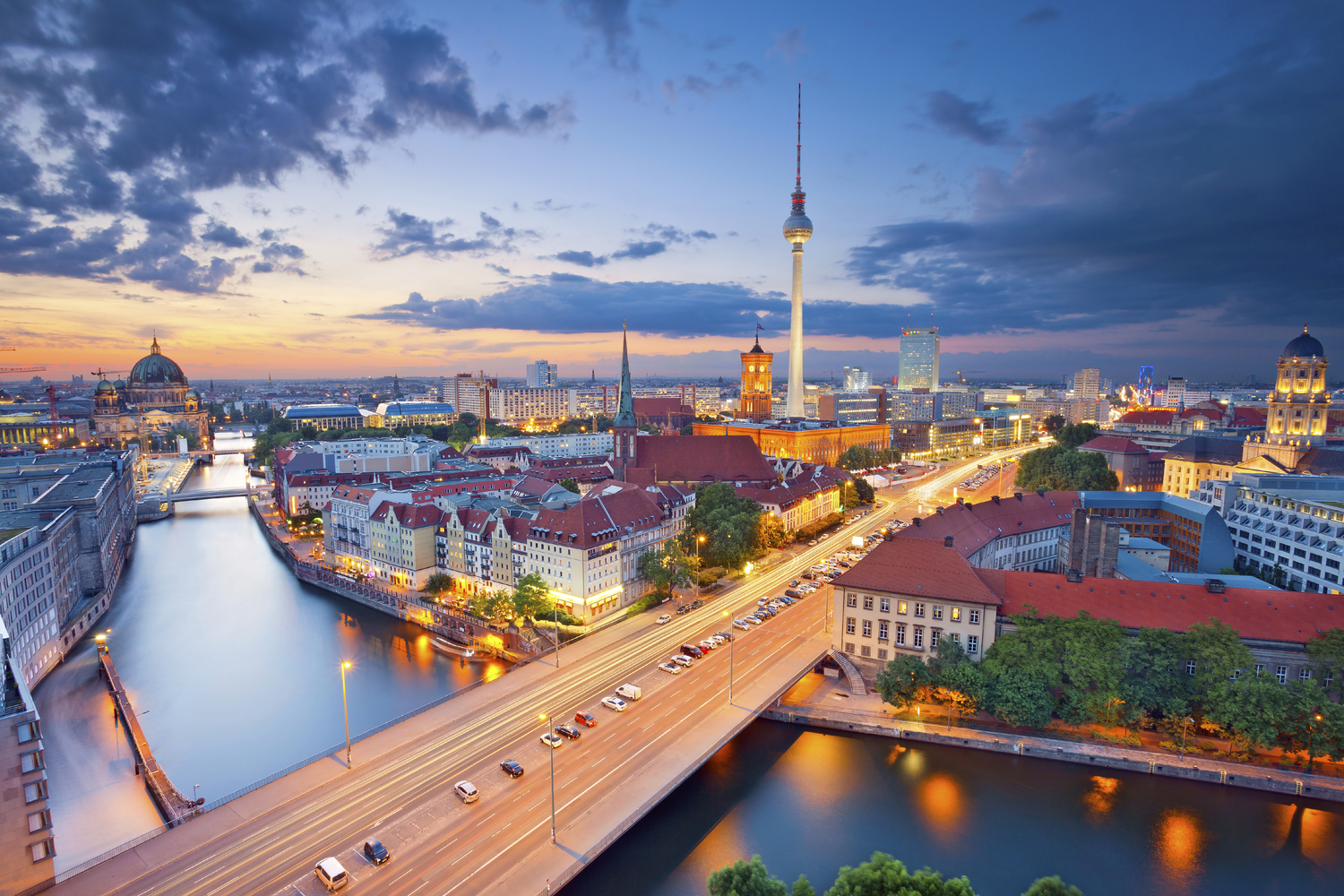
UNWTO calls for support to crisis-hit countries
UNWTO Secretary-General Taleb Rifai called for increased cooperation between tourism source markets and destinations that have been affected by crises. Addressing the 20th Summit of the Federal Association of the German Tourism Industry (BTW) on 26 September in Berlin, Germany on the topic of ‘Safe, Secure and Seamless Travel’, Rifai said: “real crises are often magnified or distorted by crises of perception. We need to enhance our support to countries affected by crises as they recover and help them increase their resilience. Supporting these countries will benefit the whole tourism sector and the whole of society.”
Attending the Summit was Chancellor Angela Merkel, who stressed the opportunities that sustainable tourism provides for developing and emerging countries. “It is important for the tourism sector to emphasize local culture and local products and services, to generate truly genuine development opportunities,” said the Chancellor. Ms. Merkel highlighted the role of tourism in development assistance. “Many refugees come from African countries. We need to give people economic development perspectives in their home countries. Tourism could contribute significantly to this,” she said.
Speaking about the need to build a framework of safe, secure and seamless travel, Mr Rifai said: “Safety and security is one of the global challenges our world is experiencing. No country is immune to security risks. Not one. It is a global responsibility that we must face together, across sectors and borders.” He called for increased cooperation, saying: “Let us respond not with isolation but with unity. We must be vigilant to ensure that cooperation prevails over isolation and that safe and seamless travel can go hand in hand”.
“A condition of tourism’s success is positive cooperation – between visitor and host, between source market and destination, and also between the tourism and security sectors. For this reason I call for the mainstreaming of tourism into national, regional and global safety and security agendas. Effective coordination, information sharing and communication mechanisms between tourism and security will lead to safer and more seamless travel, as well as better crisis management,” he added.
The UNWTO Secretary-General also welcomed the launch of the Transcultural Dialogue in Tourism series, an initiative of BTW and the Centre for Innovation and Sustainability in Tourism (CITS). “By its very nature, a partnership between Germany and one host country, this will be a truly remarkable effort to harness that incredible power of tourism to build bridges of trust and tolerance. This supports the conviction that all people, no matter how diverse their background, can benefit economies and societies. Tourism is a leading sector in providing solutions and opportunities for inclusion, and intercultural dialogue is a way of finding these solutions,” said Mr Rifai.
“The facilitation of intercultural dialogue has always been part of the essence of our sector. In these times, this dialogue is more important than ever,” said Michel Frenzel, President of BTW.
Despite current challenges, Mr Rifai stressed that tourism is proving to be one of the most resilient economic sectors worldwide, creating jobs for millions and contributing to more inclusive growth. He recalled that in 2015, international tourist arrivals reached 1.186 million, 52 million more than in 2014, and that data for the first half of 2016 confirmed this positive trend with a 4% increase in international tourist arrivals.
Mr. Rifai also highlighted the good results of Germany’s tourism sector. Germany welcomed 35 million international tourists last year, 2 million more than in 2014, earning the country 33 billion euros in exports.

World Tourism Day message from Minister Alain St.Ange of the Seychelles
As the world marks Tourism Day it is important for us in Seychelles to say “Happy Tourism Day” to each and every one, but to also say let us all rally to defend, protect and help consolidate this industry that remains the powerful vehicle to not only stimulate the economic growth of our countries, but that also remains the motor for social growth in the world at large. Today we celebrate a milestone for Seychelles. Our islands are noticed around the world, and for such accomplishment we need to thank our private sector trade, our hotels, our DMCs and our airlines for promoting Seychelles as a tourist destination.
Seychelles will soon welcome two new airlines, Qatar Airways and Turkish Airline which will bring more tourists to our paradise islands. Seychelles is now connected to the big wide world as never before and with its tourism industry remaining the pillar of its economy. We want to see Seychelles tourism bloom and to do that we will work with our National Airline, Air Seychelles along with all the other airlines partners.
We are today proud to say that we have protected what we have ben blessed with – the lush green natural landscape of our islands, our white sandy beach and our turquoise blue seas. We can be seen as good custodians of what we have and we have gone the extra mile and have now declared over 50% of the total land area of Seychelles as protected national parks. But that is just not enough because we know that our tourism industry would be on shaky ground if we did not put our culture at the centre of our tourism industry and by doing that placing our people at the very centre of our development, because without people we have no culture. This is why on this World Tourism Day, as we all celebrate the milestones achieved in our industry we need to say to ourselves that our people remain our greatest asset and we all need to embrace them in their diversity.
May Tourism Day 2016 be for the great continent of Africa a time of reflection on the protection and preservation of our rich natural heritage and this inclusive of our people in its diversity in political affiliation, colour of the skin, religious beliefs and sexual preferences. May Tourism Day 2016 also be for the World at large a time for reflection where the ambitions of one does not step on the rights of others needing tourism as a source of economic survival.
Alain St.Ange, Minister of Tourism and Culture, Republic of Seychelles
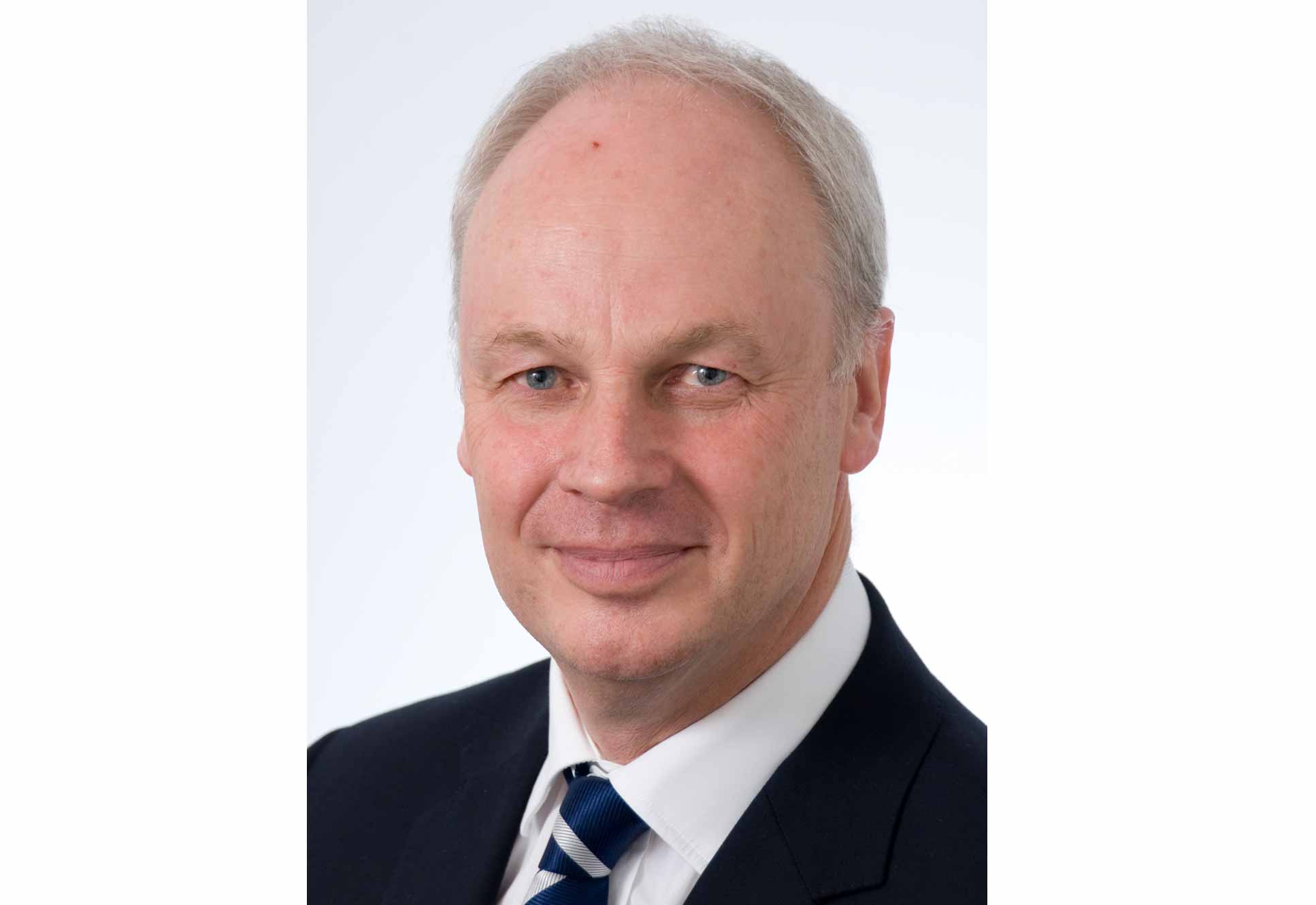
WTTC calls on the Travel & Tourism sector to be more accessible
BANGKOK, Thailand – David Scowsill, President & CEO, World Travel & Tourism Council (WTTC) has called for the Travel & Tourism sector to be more accessible, during a speech at World Tourism Day celebrations in Bangkok, Thailand.
Scowsill said: “Travel & Tourism needs to take accessibility requirements seriously. The imperative is not only moral, but it also makes good business sense.”
The global Sustainable Development Goals provide a roadmap for a more equitable and sustainable future. If Travel & Tourism is going to be truly inclusive in its growth, it must ensure that it is accessible to everyone.
Furthermore, nearly 15% of the world’s population is estimated to live with some form of disability. As populations get older, the number of people with special needs is going to increase.
“Many tourism businesses can be deterred from making themselves more accessible. Sometimes they have financial concerns about the investment necessary to alter or refit their facilities, and at other times they are concerned about offending people. That is why days such as the World Tourism Day are so important. We need to raise awareness of the opportunities of accessibility and the mechanisms by which it can be achieved,” stressed Scowsill.
Scowsill identified three priorities for the Travel & Tourism sector when it comes to accessibility:
1. Understand the market dynamics and opportunities when it comes to accessibility, and how they relate to your business so that you can prioritise actions accordingly.
1. Look at what the leading players are providing and learn from them. Often some simple adaptations or a mere awareness of the needs of people with a disability can make a big difference.
1. Partner with organisations which have experience of working in accessibility, to ensure that what you are providing is appropriate and communicated effectively.
. Scowsill further argued that catering for people with disabilities goes far beyond those travellers restricted to wheelchairs. It includes all forms of mobility restrictions, hearing or visual impairments, learning disabilities or mental health issues. It encompasses the needs of an ageing population around the world.
. WTTC also encourages accessibility in tourism through its Tourism for Tomorrow Awards. In 2015, Ilunion Hoteles won the People Category for its pioneering work in accessible design, and having a work force of people with disabilities in their hotels.
The 2017 Tourism for Tomorrow Awards are now open for entries and WTTC encourages companies that do work in accessibility to apply. Winners will be announced at WTTC Global Summit, which will be held in Bangkok, Thailand, 26 – 27 April 2017.
eTN is a media partner for WTTC.
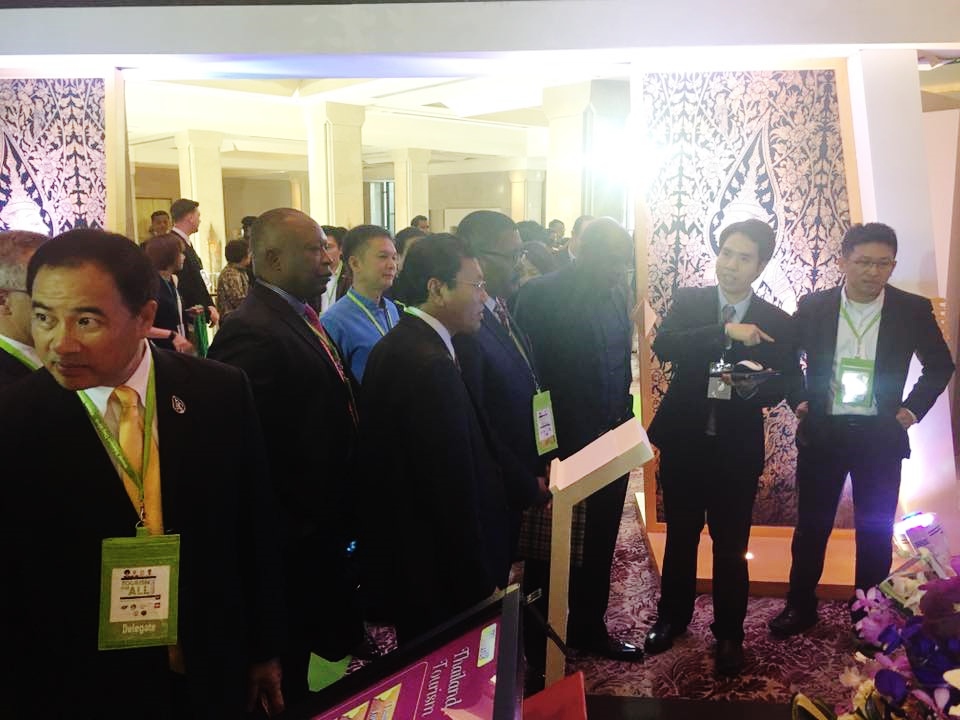
World Tourism Day event launches in Thailand
BANGKOK, Thailand (eTN) – The official celebration of World Tourism Day 2016 (September 27) has just launched in Bangkok, Thailand, under the theme, “Tourism for All,” promoting universal accessibility in the travel and tourism industry.
Thailand’s Minister of Tourism and Sports, Mrs. Konkarn Wattanavrangkulm, was on hand to welcome guests to the one-day event, as was the Hon. Dr. Walter Mzembi, candidate for the UNWTO Secretary-General position.
According to the World Health Organization (WHO), 15% of the world’s population (1 billion people) is estimated to live with some form of disability. UNWTO is convinced that accessibility for all to tourist facilities, products, and services should be a central part of any responsible and sustainable tourist policy.
World Tourism Day addresses the importance of good practices in the accessible tourism supply chain.
The opening included a touching rendition of blind people performing and singing “Somewhere Over the Rainbow.” Enjoy the images gathered by eTurboNews.
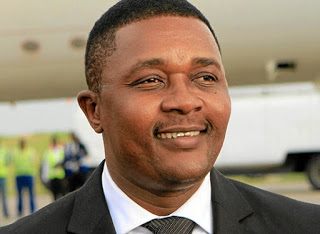
UNWTO candidate Dr. Mzembi issues statement for World Tourism Day
The outspoken candidate for the next UN World Tourism Organization (UNWTO) Secretary General, Doctor Walter Mzembi, the Minister of Tourism and Hospitality for Zimbabwe, today issued a statement for World Tourism Day.
Celebrations for World Tourism Day are held around the world, with Bangkok as this year’s official location.
Dr. Walter Mzembi said from Bangkok:
I issue this solidarity statement from Bangkok, Thailand, where we are gathered to celebrate World Tourism Day, 2016, under the theme: “Tourism for All – Promoting Universal Accessibility.” The entire government of Thailand has been mobilized around this event led by the Prime Minister, HE General Prayut Chan-o-cha, who shall deliver the keynote address.
The program also captures the involvement and various acts by the Deputy Prime Minister, our host Minister of Tourism herself, HE Mrs. Kobkarn Wattanavrangkul, and a technical visit to Khon Kaen Province, where we shall be treated to a very rich itinerary including the “performance of wheelchair men,” in line with the global theme.
What is very clear, as was the case with our hosting of the 20th session UNWTO General Assembly in August 2013, is that this is a national event taken very seriously by the entire nation and an absolute opportunity to leverage this global endorsement to bring to the fore, the country’s best foot, and its brand pay off line, “The Land of Smiles.” Hopefully, while not forgotten, this should put behind them the horrid memories of multiple assaults on the sector ‘s tourist hotspots of Hua Hin, Surat Thani, and Patong on August 12 of this year. In my condolences to the Tourism Minister, I did promise that in solidarity with the people of Thailand and the incessant attack on the sector, I was going to join the Secretary General, Dr. Taleb Rifai, and other dignitaries who include the World Travel and Tourism Council President and CEO, David Scowsill; Mario Hardy, PATA CEO, and other colleagues and ministers invited to the celebrations.
Notwithstanding the clear intentions to scare us away from this beautiful country, we are out here to reinforce the message that no amount of terror will halt the sheer force and energy of human civilization unleashed by this great revolution of our contemporary times – travel. We are here to consolidate the gains of travel, which only 65 years ago had 25 million travelers, and has since closed 2015 with 1.2 billion tourists! Today, the sector employs 288 million people, and accounts for 6% of the world’s exports at $1.5 trillion, translating to a cumulative impact of earnings of $8 trillion – 10% of the Global GDP. The sector, in line with SDGs 8, 12, and 14, shall record a minimum of 1.8 billion by 2030, which projections are now being tested and certainly need to be revised if one takes into consideration news from China that it will authorize an unbelievable 600 million outbound Chinese tourists by year 2020, from the current 128 million!
So, the best way to help conflict stricken destinations, terror targets, and now as we redefine insecurity to include natural disasters, is to visit and continue visiting those destinations. Suspend all protocols, and disregard inordinate travel advisories that seek to multiply misfortune and suffering on unfortunate destinations by endorsing them through sustained visits. The 1.2 billion tourists are potential peace ambassadors and opportunities for the world’s terror-stricken targets and the poor.
Typically, the subject of accessible tourism is key in our contemporary times. It is not only about providing tourism services to people with disabilities, but innovatively creating universally-designed, barrier-free environments that support people who may have temporary and permanent physical challenges, young children, the ever increasing elderly population, as well as creating safer environments for employees who work in the sector.
Applying inclusion principles, in my view, demands that the facilities and products which we have established or are currently under establishment, become accessible by all. This way, it helps destinations to expand their horizons in terms of inclusivity, competitiveness, and ideally lead to greater customer satisfaction, loyalty, and expansion of the business.
At the strategic and operational level, accessible tourism implies that the tourism industry needs to redesign itself to develop flexible, multi-use accessible spaces and enhance its productivity and operational management, all of which should directly assist humanity to enjoy tourism products with no hindrance, exclusion, or impediment to access.
Our varied geographical, cultural, and social disparities should not be excuses to perpetuate exclusion of others. It is imperative as we celebrate the international World Tourism Day today, to once again renew our covenant, in which with one accord we proclaim tourism as a product for all. This cannot happen without support from all of us and indeed, stakeholder collaboration to provide easily-accessible tourism products becomes a game changer.
I call upon designing and re-designing of both new and old infrastructures to enable people with unique access requirements, including mobility, vision, hearing, and cognitive dimensions dignified equity, sharing, and access.
My clarion call is that accessible tourism is everyone’s responsibility. It is indeed a collaborative process that requires full understanding of heterogeneity of access requirements informed by different types of embodiments, where the creation of an enabling environment is understood through universal design that answers to the physical and intuitive needs of different people.
Therefore, it is super critical that tourism operators in Zimbabwe, Africa, and globally, understand the visitors’ experiences on enabling or disenabling tourism environments so that those experiences help all of us to put in place needs-based infrastructure and super structures.
I mention this on the back of the ever-growing need to adapt tourism products to be more user-friendly to our traveling publics, who in some cases encounter accessibility difficulties in the travel process resulting in dissatisfaction.
Yet, when there is an enabling tourism environment, visitors’ experiences become memorable, joyous, dignified, and equitable. It is this missing link that we should look at and address as a new growth opportunity in our destinations. Clearly, simple design solutions can make a huge difference and open our destinations to accessibility required by markets as well as improving operational efficiency of the tourism business.
There is a realization that building of hotels, restaurants, theatres, public spaces, public transport, streets, and squares often are insufficiently inaccessible to people enabled differently. Many inconveniences occur when some of our people want to use facilities. Thus, this calls for the application of minimum standards to cater for the physically challenged so that tourism value chains are not seen as discriminatory.
“Tourism for all – Promoting universal accessibility” is a call for global commitment to reposition the tourism industry less through talk shows, but more through instituting practical solutions to “quick-fix” action to close the gaps which make tourism products inaccessible. It is refreshing that the UNWTO is celebrating this day in 2016 on the back of 2017, the “International Year of Sustainable Tourism for Development.” This is a befitting theme, and part of our discussions and outcomes will significantly shape the destiny of delivering sustainable and inclusive tourism product value chains, and repositioning of global tourism for all.
As usual, because of our unique economic circumstances, there is always an attempt to domesticate international themes to answer our own challenges, and one such debate has been how pricing of tourism and hospitality services, especially in the wake of a bullish United States dollar, our anchor currency has denied the majority of our people access to these assets. It is a very valid argument for another day, and aligns itself to an international argument on the behavior of currencies actually now impacting the performance of the sector globally.

ICTP and Inclusive Tourism: World Tourism Day Initiative from Nepal
Tomorrow is World Tourism Day. This year the UNWTO event is hosted by Thailand in Bangkok. However the day is celebrate anywhere in the world.
Every year World Tourism Day has a special focus.
This year World Tourism Day is about accessible and inclusive tourism.
The chapter in Nepal for the International Coalition of Tourism Partners (ICTP) initiated by its chapter president Pankaj Pradhananga of Four Seasons Travel & Tours in Kathmandu has been working on this challenge in Nepal tirelessly.
Mr. Pradhananga told eTurboNews:
“Inclusive Tourism is a relatively new term in Nepal. Though the effort of opening up for accessible and inclusive Tourism has already begun, it is still in its infancy. A major concern for Destination Nepal is the lack of awareness and absence of mandatory law in place to encourage Tourism operating sectors for coming up with accessible Tourism products.
Given the enormous economic and social benefits to be derived from Inclusive Tourism, it is the high time for the industry to understand and develop Inclusive tourism in the gateway to Himalaya.
Nepal was struck with devastating earthquake on the 25th April 2015 which also left more than 4,000 Nepalese with physical disabilities. It is rather more important to build accessible infrastructure for the benefit of the locals as well the foreign tourists who want to enjoy Natural and cultural beauty of Nepal.
Focusing on making the state and Tourism entrepreneurs understand the importance of inclusive tourism will not only benefit the tourism industry, it will also connect the vibrant DPOs ( Disabled People Organizations) and Tourism operating sectors.
Tour operations in Social Entrepreneurship models can also empower the PWDs and also create jobs for the Assistants who also provide services to the local PWDs.
Aftermath April Earthquake, Nepal is in the process of rebuilding the nation along with its historic monuments in Kathmandu valley. A focus on Inclusive Tourism will also ensure such moments are rebuilt keeping in mind the accessibility needs of local PWDs and Elderly travelers.
ICTP and Its Himalayan chapter president, Pankaj Pradhananga is leading the initiative of Inclusive Tourism in order to help Destination Nepal to bounce back. ICTP also believes it will not only ensure responsible practices in Tourism, it will also prove to be a sustainable model of Tourism development in the long run.
The International Coalition of Tourism Partners in Nepal is extending its best wishes on the occasion of World Tourism Day with the theme Tourism for all – Universal accessibility.
More information on ICTP : http://www.ictp.travel

ICTP President: Climate Change is Existential – Act Now
Just in time for Tuesday’s World Tourism Day, Professor Geoffrey Lipman, the President of the International Coalition of Tourism Partners (ICTP) is revealing his thoughts on Green Growth, in an age of increasing Climate Realities.
He writes:
I decided to start a blog despite knowing it’s a discipline I hate. So let me say from the outset it will be spasmodic and only when there’s something important to say. And today there is.
Today, when we rightly focus on all the positive potential of Tourism for our future there is something of underlying importance to also consider . It’s about existential climate change: repeat existential. Which means if we don’t start the fix for global warming now our grandkids will freeze or fry.
I have decided to spend the rest of my working days trying to focus on that fix – and specifically how the Travel & Tourism sector can fully play its part. I am hopeful that ICTP and its Members will be leading the charge.
Fortunately, there is a chance the battle can be won. We are on the verge of a historic ratification of the Paris Climate Accord in no small measure due to the extraordinary leadership of Presidents’ Xi and Obama, both of whom understand the incredibly short time we really have, to shift away from our global carbon addiction. It is increasingly likely that ratification levels will be reached this year and that ICAO will slowly begin to manage aviation emissions next month.
This is just the start of a 3-decade carbon detox that will require a new dedication from every stakeholder, a new ability to think outside the box and new ways of doing business – investing in technology innovation and fiscal measures to spur the change.
Most importantly there is a delivery challenge – while the Global Accords and carbon reduction targets are established by sovereign states, the real action will have to be at the local community level – urban and rural – and the masses of sme’s that dominate the value chain.
The pace of change will be far greater than we can imagine now – trillions of changes in millions of places. And the stakes will be high – 12 trillion dollars of opportunity according to Bloomberg, to hit the 2-degree C stabilization mark. Much more for the 1.5 degrees C that most experts say is the real target.
When I discussed this with Maurice Strong, one of the founding fathers of modern day sustainability thinking and a friend and mentor for 20 years, shortly before he passed away last year, we talked about finding ways to take the best of climate response thinking to the grass roots of the Travel and Tourism sector. And to do so in a way that could be low cost, high impact and scalable in line with the Paris Accord. He urged me to keep up the good fight on climate change as the existential challenge of sustainable development.
SUN is the result – the Strong Universal Network – a growing community of communities, who recognize the existential nature of Climate Change and act glocally to deal with it. SUN is built on a vision of Impact-Travel – where the positive and negative elements of tourism are recognized, managed and measured coherently. It is based on Green Growth for low carbon, resource efficiency and biodiversity conservation, while strengthening jobs, inclusion and trade and “reconnecting” nature, urbanization and people. Impact-Travel embraces hyper-connectivity, technology acceleration, the internet of things and web/human interface – what the World Economic Forum calls a 4th Industrial Revolution (4IR).
With committed colleagues from around the world, we’ve begun to work on this kind of existential climate change focused, transformation system. A cloud connected network of solar powered hubs, with a smart technology platform to identify best of breed innovation, learning systems, performance enhancing tools/services, for measured and managed Impact Travel. Most importantly targeting the base of the pyramid – the community – to make sure that the change respects local culture and is inclusionary from the outset.
In future articles I’ll try to lay out how we plan to advance this during the 2017 International Year of Tourism, how we want to engage within and outside the sector and how we will outreach first to UN regions in 2018 and then globally by 2020, with Expo Dubai as a grand visible booster, to link deeply into the Paris Accord response system.
This is a start – up activity, funded to date by a small number of committed partners. Our next step is to secure impact investment to take it to breakeven level. If you are interested to be a part of this existential climate focused SUN movement, please contact Geoffrey Lipman:
[email protected]
www.thesunprogram.com

